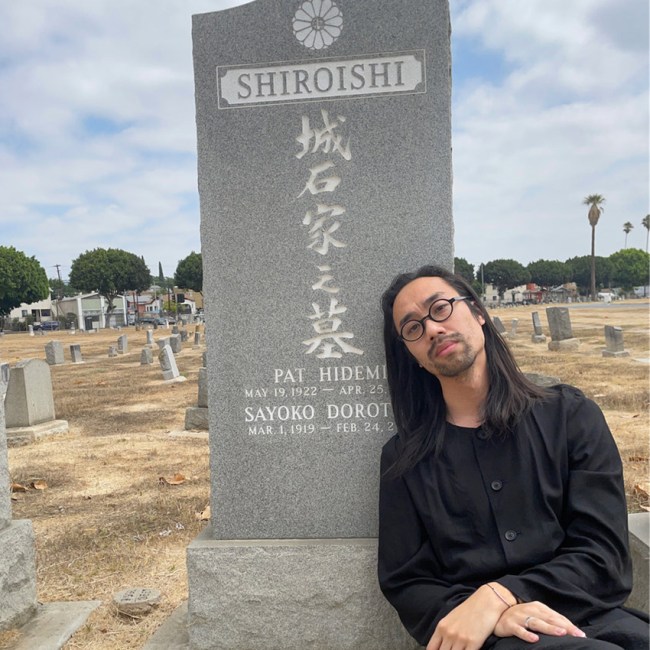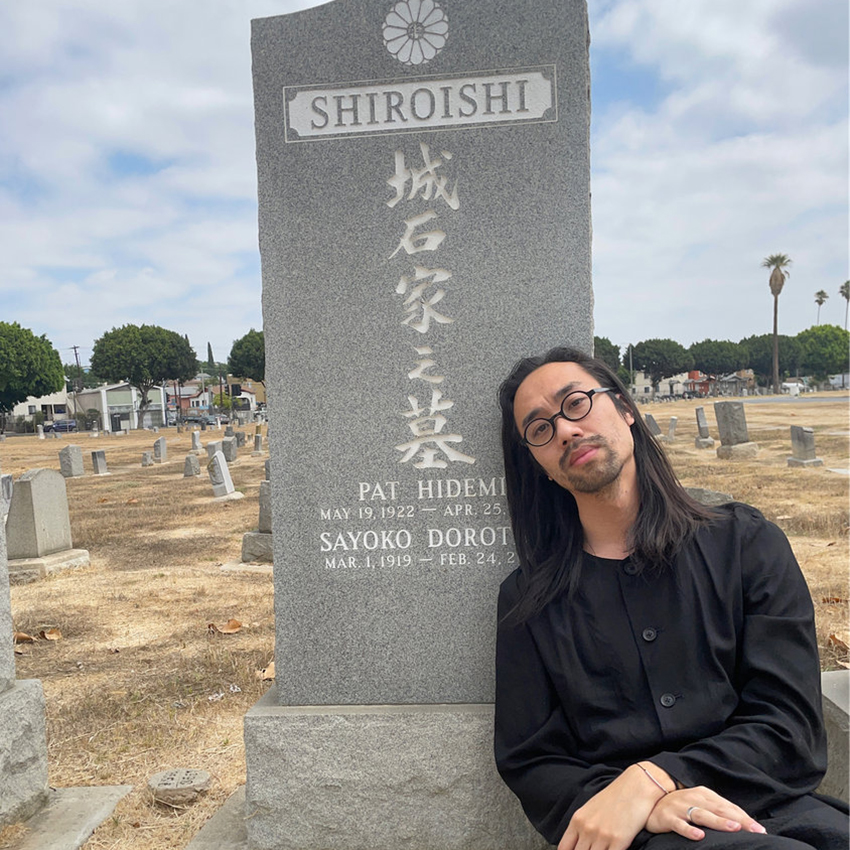
Michael McKinney takes the hardest route – successfully deconstructing jazz in under 2000 words.
Patrick Shiroishi has made a career out of reckoning with histories, stretching them out and tangling them up into new forms. He is best known for playing saxophone in jazz-adjacent circles, but his stylistic roots run wider than genre nomenclature would imply: he has played in brutal-prog groups, was classically trained in guitar, and grew up near The Smell, a D.I.Y. venue in downtown Los Angeles famous for raucous and defiantly experimental bookings. (It should come as little surprise that John Zorn’s Naked City, a full-throttle jazz-metal freakout of a record, changed his life.) In his work, Shiroishi takes these myriad influences—both sonic and ideological—and filters them through the shattered lenses of individual, familial, and communal stories.
His oeuvre is accordingly varied. He has assembled a dizzying CV in an ever-growing number of ensembles: noisy electronic collagery, intimate musique concrète, glacial duets for saxophone and strings, sparsely populated field recordings, ECM-indebted chamber-jazz. He tends to rein things in a bit for his solo work, focusing on personal histories rather than aesthetic traditions. In 2017, he released Tulean Dispatch, a volatile and discordant reflection upon his grandfather’s time in the Lake Tule internment camp; four years later, he recorded i shouldn’t have to worry when my parents go outside, an elegant and pained series of tracks in response to 2021’s spike in violence against Asian-Americans.
This range makes Shiroishi tough to pin down, even though he’s a mainstay of Los Angeles’s experimental-music scene. But one throughline stands out. His music is concerned with conversation, no matter the form: a quartet sending files over Dropbox, a trio interrogating the language of free jazz, a duo composing around snatches of found sound, an individual opening his history book. With Hidemi, Shiroishi lays that core bare. On one level, it is twenty-five minutes of minimal and bracing jazz compositions; on another, it is a kaleidoscope of feeling, bridging hard-won joys and pain that cuts to the marrow.
This emotive variance is encapsulated in the book released alongside the LP. Inside the pages of Tangled: A Collection of Writings From Asian American Musicians, sixteen musicians share stories and poetry about their experiences as Asian-Americans, blurring the spaces between sorrow and celebration, pride and fear, displacement and community. In his entry, Shiroishi touches upon the concept of “gaman”: to “endure the seemingly unbearable with patience and dignity.” As a child, if asked to do something he wasn’t keen on, “I was told to ‘gaman’ until I did what was needed.”
Examples of this surface throughout the texts. One author recalls learning a full-toothed smile to fit in with white classmates (“mom told me i should smile really big (to make up for the things i wasn’t born with)”). Grandparents order silverware, two pieces at a time, over the course of several paychecks. College students purchase pepper spray for their parents, just in case they might need it. From one angle, these are stories about resilience. But, just as critically, they are about families and tightly held histories: children, parents, and parents’ parents, stretching across oceans, languages, and traditions.
On Hidemi, Patrick Shiroishi uses his saxophone to reckon with the history of his namesake, Hidemi Pat Shiroishi, a third-generation Japanese-American who died before Patrick was born. Shiroishi’s grandfather seems to have entered his home through memories, stories, and reflections, but that sort of intangibility offers the saxophonist plenty to speak with. This time, his closest sonic companions are minimalists and experimental composers the world over: Wacław Zimpel, whose elliptical phrases grow until they become too massive to ignore; Steve Reich, who fractures rhythms into new forms via repetition; and frequent collaborator Matthew Sage, whose work blurs the line between the pastoral and the queasy.
The music on Hidemi, in other words, tracks with the rest of his discography while pushing it forward. It is insular but peppered with a wide range of tangible reference points, burrowing between genre traditions and finding new forms in the spaces between. At its most subtle, Shiroishi’s playing is downright spectral, and at its most wild-eyed an endless supply of pent-up frustration seems to come blaring out of his horn. This series of dualities is achieved, in part, thanks to clever multitracking: Shiroshi quintuples down on his instrument here, layering tenor, alto, and soprano saxophones into veritable sheets of sound.
“Beachside Lonelyhearts” makes this voluminous ethos clear from the start with its train-whistle cluster of woodwinds, each blast portending an incoming danger. But Shiroishi makes the canny—and equally predictive—decision to promptly undercut that force, shifting gears into plaintive melodies, a mournful tumble atop wide-open chords. The record is full of moves like this: barely controlled chaos ratcheted down at the last moment, piles of instruments and tempi giving way to plainspoken minimalism.
This approach affords Shiroishi plenty of space to maneuver. “What Happens When People Open Their Hearts” begins as a slow-motion duet, but one of the partners grows agitated, moving in increasingly frantic patterns until it turns to a flurry of notes. In the piece’s final moments, the lines reunite. The frenzied and calm find a blistering middle ground as a white-hot chord pierces the noise, stretching into infinity. The last-minute reunification acts as hard-earned catharsis: a cloud of dissonance gives way to a harsh and clarifying blast of sunlight.
“Jellyfish in the Sky” is a dance for three, all close harmonies locked in a descent that eventually turns to a series of stretched-out chords. “To Kill a Wind-Up Bird” takes the approach to an extreme, oscillating between sounds at a rapid clip: tightly coiled saxophones bleating in unison; melodies circling each other atop a stop-start bass line; cacophonous playing melting away into a hymnal bridge, only to resurface with a bit more gut-punch energy not long after.
This parabolic rhythm makes Hidemi’s barest moments all the more affecting. “Without the Threat of Punishment There Is No Joy in Light” is the record’s loneliest piece, a single saxophone moving between a frenzied high-end and a more somber alto register. The sheer amount of negative space between Shirhoishi’s notes turns the piece a bit mournful, coming off like a duet for one: a song made elegiac thanks to what’s missing.
That conversation with emptiness—fractured histories and missing voices—runs through much of Hidemi. “Punishment” makes this clearest thanks to its monastic sound, but it is likely no coincidence that the record’s first dip into scrambled soloing—“Tule Lake Like Yesterday”—is named after the camp in which Shiroishi’s grandfather was imprisoned. There, Shiroishi takes a Reichian approach to rhythm, laying countervailing rhythms atop each other to offer a shifting foundation for an increasingly unsettled topline. It is the sound of Shiroishi creating a structure only to push against it until it can no longer hold.
Writing in Tangled, Shiroishi puts his foot down. “We can no longer ‘gaman,’” he says. “We must be loud and speak up, so what our grandparents and ancestors went through will not be forgotten or taken for granted.” On Hidemi, he channels decades of hope and pain through his horn, finding rays of light peeking through a gnarled family tree. He blurs traditions and moods until they molt into entirely new forms: gloomy free-jazz minimalism, ebullient kitchen-sink blasts, haunted and disorienting tonal explorations.
The only words recited on Hidemi arrive on its final track. Shiroishi’s voice cuts through the elliptical playing of “The Long Bright Dark,” a million voices crying out in Japanese: “Is this the end of the storm?” The chorus of horns pauses for a moment, affording his question the space it deserves: the traumas and joys outlined in Tangled grow more visible with each passing day; will the former help unravel the latter? And then the sound barrels on. Saxophones spiral around each other at a manic pace, blasts of woodwinds turning to a hurricane of sound. It is tumultuous and uplifting, a mirror held up to the tangled histories that Shiroishi centers. Of course even its climaxes are laced with thorns, just as its loneliest moments contain communal beauty. Hidemi is the sound of Shiroishi refusing to hold his tongue any longer. In the resultant blur, he pours generations of sound out of his saxophone, stretching towards a deeply felt and more unrestrained future.

